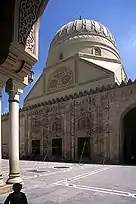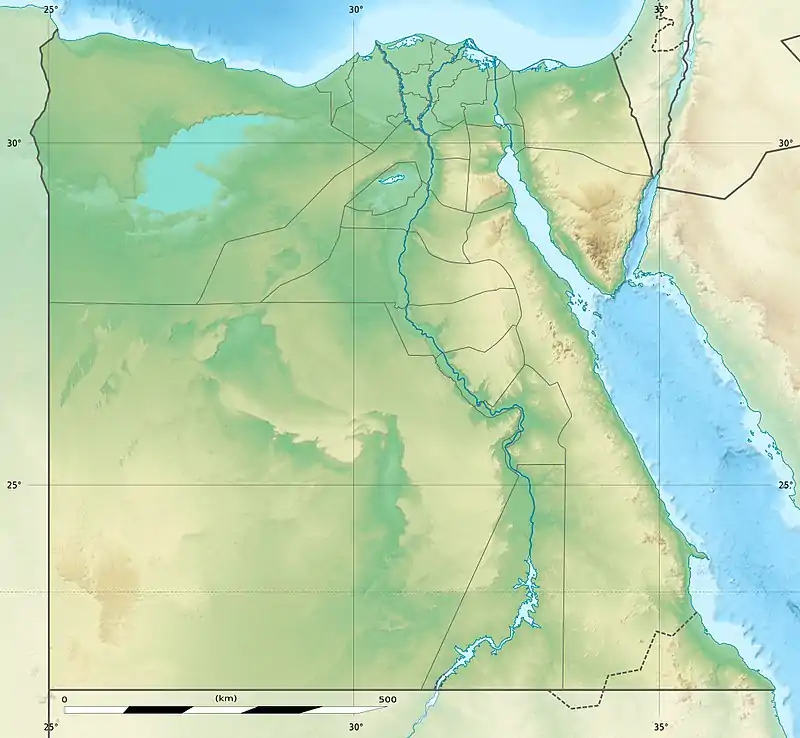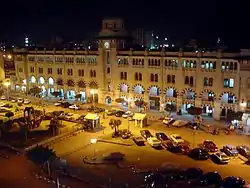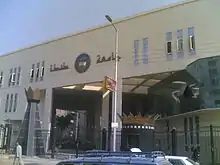Tanta
طنطا | |
|---|---|
    Clockwise from top: Sheikha Sabah Mosque dome, Ahmad Al-Badawi Mosque, Sabil Ali-Bek, Tanta Overview | |
| Nickname: Tanta | |
 Tanta Location of Tanta within Egypt | |
| Coordinates: 30°47′N 31°0′E / 30.783°N 31.000°E | |
| Country | |
| Governorate | Gharbia |
| Area | |
| • Total | 19.5 km2 (7.5 sq mi) |
| Elevation | 12 m (39 ft) |
| Population (2021)[1] | |
| • Total | 576,648 |
| • Density | 30,000/km2 (77,000/sq mi) |
| Time zone | UTC+02:00 (EET) |
| Area code | (+20) 40 |
Tanta (Egyptian Arabic: طنطا Ṭanṭa pronounced [ˈtˤɑntˤɑ], Coptic: ⲧⲁⲛⲧⲁⲑⲟ) is a city in Egypt with the country's fifth largest populated area and 658,798 inhabitants as of 2018.[2] Tanta is located between Cairo and Alexandria: 94 km (58 mi) north of Cairo and 130 km (81 mi) southeast of Alexandria. The capital of Gharbia Governorate,[3] it is a center for the cotton-ginning industry.[4] One of the major railway lines goes through Tanta.[5][6] Annual festivals are held in Tanta for one week beginning on 11 October celebrating the birthday of Ahmad al-Badawi, a revered Sufi figure of the 13th century, who founded the Badawiyya Tariqa in Egypt and is buried in Ahmad Al-Badawi Mosque, the main mosque of Tanta. Tanta is known for its sweet shops and roasted chickpeas.[7]
Overview

The older name of the city is Tandata (Arabic: طندتا) which comes from its Coptic name.[8]
With its large cotton plantations, in 1856, Tanta became a stop on the railway network, primarily for the benefit of exporting its cotton to European markets.[9] The area around Tanta was mostly fields but Tanta had grown into a large crowded city.[10]
This city is a center of celebration in late October at the end of the cotton harvest. Three million people,[3] from around the Delta and other parts of the Arab world, come for the Moulid of Sayid Ahmed el-Badawi,[11] which is a colorful,[12] religious, eight-day celebration. The moulid is centered around the mosque and tomb of Sayid Ahmad al-Badawi,[13] who founded one of Egypt's largest Sufi orders known as Ahmadiyyah or Badawiyya.[14] He was born in Morocco, but emigrated to Arabia, and later was sent to Tanta in AD 1234 as a representative of the order from Iraq. He was granted permission to start a new order in Tanta and it soon flourished into one of Egypt's largest Sufi brotherhoods.[11]
Tanta is famous for its sweet candy made of gelatin, coconut, sesame, peanuts, and chickpeas. Large quantities are sold during the mulid (Arabic: المولد) festivals when many Egyptians visit the city.[15] The sweets have been considered a delicacy since the 1800s.[16]
Tanta has many cotton processing factories and textile industries,[11] and is also a university town with Tanta University since 1972.[17]
The people of Tanta are called by Egyptian slang Tantawi.[18][19]
Sites
- Montazah garden
- Tanta stadium
- Tanta sporting club
- Tanta teachers club
- Tanta University
- Virgin Mary Coptic Orthodox church, which is over 200 years old[20]
- Saint George Cathedral
- Saint Peter Catholic basilica
- The Museum of Tanta contains items from ancient nearby sites of Sais, Naucratis, and Buto, such as pottery and statues.[21][22]
- El Mahallah is a large industrial town near Tanta, famous for its textiles.[11]
 Tanta's city center, Elgeish street.
Tanta's city center, Elgeish street. Tanta's railway station at night
Tanta's railway station at night Mosque of Elsayyed Elbadawi
Mosque of Elsayyed Elbadawi Saint George Cathedral Church
Saint George Cathedral Church Tanta Railway Station
Tanta Railway Station palace in Tanta which was used as a primary school named flowers school
palace in Tanta which was used as a primary school named flowers school Tanta Montaza park
Tanta Montaza park Tanta museum
Tanta museum Tanta university administration
Tanta university administration
Climate
As all of Egypt, has a hot desert climate (BWh), according to Köppen-Geiger climate classification system.
| Climate data for Tanta, Egypt (1961–1990) | |||||||||||||
|---|---|---|---|---|---|---|---|---|---|---|---|---|---|
| Month | Jan | Feb | Mar | Apr | May | Jun | Jul | Aug | Sep | Oct | Nov | Dec | Year |
| Record high °C (°F) | 29.2 (84.6) |
32.0 (89.6) |
36.8 (98.2) |
41.6 (106.9) |
45.3 (113.5) |
44.7 (112.5) |
41.5 (106.7) |
42.5 (108.5) |
41.2 (106.2) |
38.7 (101.7) |
35.6 (96.1) |
28.2 (82.8) |
45.3 (113.5) |
| Mean daily maximum °C (°F) | 18.7 (65.7) |
19.4 (66.9) |
22.1 (71.8) |
27.1 (80.8) |
31.0 (87.8) |
33.6 (92.5) |
33.1 (91.6) |
32.7 (90.9) |
31.6 (88.9) |
29.2 (84.6) |
24.2 (75.6) |
20.3 (68.5) |
26.9 (80.4) |
| Daily mean °C (°F) | 12.0 (53.6) |
12.8 (55.0) |
14.5 (58.1) |
18.4 (65.1) |
22.1 (71.8) |
25.4 (77.7) |
26.0 (78.8) |
25.8 (78.4) |
24.2 (75.6) |
21.6 (70.9) |
17.5 (63.5) |
13.5 (56.3) |
19.5 (67.1) |
| Mean daily minimum °C (°F) | 6.5 (43.7) |
6.6 (43.9) |
7.8 (46.0) |
11.2 (52.2) |
14.3 (57.7) |
17.3 (63.1) |
19.7 (67.5) |
19.7 (67.5) |
17.8 (64.0) |
15.3 (59.5) |
11.5 (52.7) |
8.0 (46.4) |
13.0 (55.4) |
| Record low °C (°F) | 0.2 (32.4) |
0.4 (32.7) |
0.8 (33.4) |
4.6 (40.3) |
8.3 (46.9) |
12.0 (53.6) |
14.8 (58.6) |
16.4 (61.5) |
13.7 (56.7) |
9.1 (48.4) |
5.0 (41.0) |
1.6 (34.9) |
0.2 (32.4) |
| Average precipitation mm (inches) | 13 (0.5) |
8 (0.3) |
7 (0.3) |
3 (0.1) |
2 (0.1) |
0 (0) |
0 (0) |
0 (0) |
0 (0) |
2 (0.1) |
4 (0.2) |
12 (0.5) |
51 (2.1) |
| Average precipitation days (≥ 1.0 mm) | 1.7 | 0.9 | 0.9 | 0.5 | 0.2 | 0.0 | 0.0 | 0.0 | 0.0 | 0.3 | 0.6 | 1.5 | 6.6 |
| Average relative humidity (%) | 72 | 69 | 68 | 60 | 57 | 58 | 66 | 71 | 69 | 67 | 70 | 71 | 66.5 |
| Average dew point °C (°F) | 6.6 (43.9) |
6.5 (43.7) |
8.0 (46.4) |
9.8 (49.6) |
11.7 (53.1) |
15.3 (59.5) |
18.8 (65.8) |
19.4 (66.9) |
17.4 (63.3) |
14.3 (57.7) |
10.7 (51.3) |
7.9 (46.2) |
12.2 (54.0) |
| Mean monthly sunshine hours | 205.6 | 198.8 | 256.7 | 280.3 | 325.1 | 357.9 | 332.6 | 342.8 | 280.5 | 278.0 | 229.7 | 205.3 | 3,293.3 |
| Source: NOAA[23] | |||||||||||||
Notable people
- Magda al-Sabahi or Magda Sabbahi = Magda (1931-2020) actress
- Huda Sultan (1925-2006) singer and actress
- Kamal Amin (1923–1979), artist[24]
- Mahmoud Zulfikar (1914-1970), Film director
- Khairy Beshara, film director
- Abdu al-Hamuli (Arabic: عبده الحامولى) (1836–1901), singer
- Mahmoud Khalil Al-Hussary, (1917–1980) reciter of the Qur'an[25]
- Mohamed Fawzi (1918–1966), composer, singer, and actor[26]
- Naima Akef (1929–1966), actress and circus player
- Doria Shafik (1908–1975), leader of the Women's Liberation Movement in the early 1950s[27]
- Ahmed Hijazi (1936–2011), known as "Hegazy", a caricature artist[28]
- Nasr Abu Zayd (1943–2010), thinker and liberal theologian [29]
- Ahmed Khaled Tawfik (1962–2018), author[30]
- Amina Rizk (1910–2003), actress
- El-Sayed Nosseir (1905–1977), Olympic Gold medal winner in weightlifting[31]
- Hilana Sedarous first female Egyptian doctor and first female Egyptian gynaecologist
- Maximos V Hakim, Melkite Greek Catholic Patriarch[32]
- Nabil Farouk, novelist[33][34]
- Ziad Sakr Egyptian professional squash athlete. First ever squash player from Tanta, Egypt to win a British Junior open title in 2012
See also
References
- 1 2 3 "Egypt: Governorates, Major Cities & Towns - Population Statistics, Maps, Charts, Weather and Web Information". www.citypopulation.de. Retrieved 17 June 2023.
- ↑ World Gazetteer. "Statistical information on Tanta, Egypt". Archived from the original on 8 December 2012. Retrieved 2016-11-14.
- 1 2 Raafat, Shaimaa (October 21, 2014). "Tanta receives 3 million visitors participating in Moulid Al-Sayed Al-Badawy festival". Daily News Egypt. Archived from the original on 17 November 2016. Retrieved 17 November 2016.
- ↑ Chaichian, Mohammad A. (2009). Town and Country in the Middle East: Iran and Egypt in the Transition to Globalization, 1800–1970. Lexington Books. ISBN 9780739126776. Retrieved 17 November 2016.
- ↑ Ayyad, Mohamed (July 27, 2015). "Siemens, Egyptian Railway sign MoU to develop major lines' sign lighting". Daily News Egypt. Archived from the original on 17 November 2016. Retrieved 17 November 2016.
- ↑ Seif, Ola R (October 12, 2015). "Train of thoughts". ahram online. Retrieved 17 November 2016.
- ↑ Dan, Richardson; Jacobs, Daniel (February 1, 2013). The Rough Guide to Egypt. Penguin. ISBN 9781409324263. Retrieved 17 November 2016.
- ↑ Peust, Carsten. Die Toponyme vorarabischen Ursprungs im modernen Ägypten. p. 94.
- ↑ Chaichian, Mohammad A. (2009). Town and Country in the Middle East: Iran and Egypt in the Transition to Globalization, 1800–1970. Lexington Books. p. 131. ISBN 9780739126776. Retrieved 18 November 2016.
- ↑ Huston, Perdita (2001). Families as We are: Conversations from Around the World. Feminist Press at CUNY. p. 63. ISBN 9781558612501. Retrieved 17 November 2016.
streets in Tanta Egypt.
- 1 2 3 4 Richadson, Dan; Jacobs, Daniel (August 2, 2010). The Rough Guide to Egypt. Penguin. ISBN 9781405387736.
- ↑ Denny, Frederick (September 21, 2015). Introduction to Islam. Routledge. p. 245. ISBN 9781317347279. Retrieved 16 November 2016.
- ↑ Brockman, Norbert (13 September 2011). Encyclopedia of Sacred Places, Volume 1. p. 321. ISBN 9781598846546. Retrieved 15 November 2016.
- ↑ el-Aswad, El-Sayed (July 13, 2012). Muslim Worldviews and Everyday Lives. Rowman Altamira. p. 77. ISBN 9780759121195. Retrieved 16 November 2016.
- ↑ Marcus, Antoine (13 February 2016). "A Glimpse of Tanta, Egypt's "Boss Town"". Egyptian Streets. Retrieved 17 November 2016.
- ↑ Karl, Baedeker (1885). Egypt: Handbook for Travellers : Part First, Lower Egypt, with the Fayum and the Peninsula of Sinai. Harvard: Karl Baedeker. Retrieved 16 November 2016.
- ↑ "Tanta University History". Tanta University. Retrieved 16 November 2016.
- ↑ Marcus, Antoine (13 February 2016). "A Glimpse of Tanta, Egypt's "Boss Town"". Egyptian Streets. Archived from the original on 11 October 2016. Retrieved 17 November 2016.
- ↑ Elsamadouny, Zeyad. "Night Ride in Tanta". Youtube. Archived from the original on 2021-12-13. Retrieved 17 November 2016.
- ↑ "Christianity in Ebiar Village Tanta". A Sense of Belonging. 13 December 2011. Retrieved 17 November 2016.
- ↑ "SCA Tanta Museum". Supreme Council of Antiquities. Retrieved 17 November 2016.
- ↑ Hudson, Kenneth; Nicholls, Ann (June 18, 1985). The Directory of Museums & Living Displays. Springer. p. 208. ISBN 9781349070145. Retrieved 17 November 2016.
- ↑ "Tanta Climate Normals 1961–1990". National Oceanic and Atmospheric Administration. Archived from the original on October 4, 2023. Retrieved October 4, 2023.
- ↑ "Kamal Amien Bio". Fine Art Gov Egypt. Retrieved 17 November 2016.
- ↑ "Mahmoud Khalil Al Hussary". Assabile. Archived from the original on 19 November 2016. Retrieved 17 November 2016.
- ↑ "Mohamed Fawzy (1918–1966) محمد فوزي". El Cinema. Archived from the original on 16 November 2016. Retrieved 15 November 2016.
- ↑ Smith, Bonnie G. (2008). The Oxford Encyclopedia of Women in World History: 4 Volume Set. Oxford University Press, USA. p. 27. ISBN 9780195148909.
- ↑ Mahmoud, Sayed (October 24, 2011). "Hegazy, Master of Egyptian cartoons". ahram online. Archived from the original on 16 November 2016. Retrieved 15 November 2016.
- ↑ "Professor Nasr Hamid Abu Zayd". Philosophers of the Arabs. Archived from the original on 17 November 2016. Retrieved 17 November 2016.
- ↑ Yaqoob, Tahira (March 16, 2012). "Ahmed Khaled Towfik, Egypt's doctor of escapism". Archived from the original on 17 November 2016. Retrieved 17 November 2016.
- ↑ "Sayed Nossier". SR / Olympic Sports. Archived from the original on 2015-02-20.
- ↑ "Patriarch Maximos V (George) Hakim †". Catholic Hierarchy. Retrieved 17 November 2016.
- ↑ "Dr. Nabil Farouk Biography". Rewayat Club. Retrieved 15 November 2016.
- ↑ Almazroui, Ayesha (March 8, 2015). "If we want to keep Arabic alive, don't blame English". The National. Archived from the original on 16 November 2016. Retrieved 15 November 2016.
External links
- Egypt: Handbook for Travellers : Part First, Lower Egypt, with the Fayum and the Peninsula of Sinai by Karl Baedeker (1885)
- Families as We are: Conversations from Around the World by Perdita Huston, 2001
- The Encyclopædia Britannica: a dictionary of arts, sciences, literature and general information by Hugh Chisholm, 1910
- The Coptic Diocese of Tanta